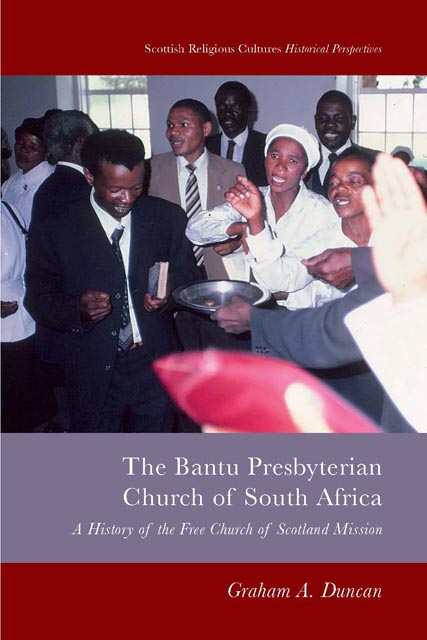Book contents
- Frontmatter
- Contents
- Acknowledgements
- Timeline
- A Presbyterian Anthem
- Introduction
- 1 Background to this Study
- 2 The Origins and Early Development of Scottish Presbyterian Mission in South Africa, 1824–65
- 3 Rev. Tiyo Soga (1829–71): A Paragon of Early Indigenous Leadership
- 4 The Role of Mission Councils in the Scottish Mission in South Africa, 1864–1923
- 5 The Rev. Edward Tsewu’s Dispute with the Free Church of Scotland Mission
- 6 The Mzimba Secession, 1898: A South African ‘Disruption’
- 7 Presbyterianism in South Africa, 1897–1923: To Unite orNot to Unite?
- 8 Preparations for the Formation of the Bantu Presbyterian Church of South Africa, 1897–1919
- 9 The Formation of the Bantu Presbyterian Church of South Africa, 1920–3
- 10 Mission to Church – Church to Mission: The First Ten Years, 1923–33
- 11 Reaching Out: The Bantu Presbyterian Church in South Africa and the Presbyterian Church of South Africa and Ecumenism, 1923–39
- 12 The Bantu Presbyterian Church in South Africa and Ecumenism, 1940–99
- 13 The End of Mission Councils: The Church of Scotland South Africa Joint Council, 1971–81
- 14 A Young Church in Mission or Maintenance Mode?: The Bantu Presbyterian Church of South Africa, 1923–99
- 15 The Bantu/Reformed Presbyterian Church and Socio-political Issues
- 16 Bantu/Reformed Presbyterian ChurchWomen in Leadership in Ministry
- Conclusion: Indigenous Presbyterians and Missionaries –Transferring Contending Roles and Responsibilities
- Bibliography
- Index
8 - Preparations for the Formation of the Bantu Presbyterian Church of South Africa, 1897–1919
Published online by Cambridge University Press: 26 November 2022
- Frontmatter
- Contents
- Acknowledgements
- Timeline
- A Presbyterian Anthem
- Introduction
- 1 Background to this Study
- 2 The Origins and Early Development of Scottish Presbyterian Mission in South Africa, 1824–65
- 3 Rev. Tiyo Soga (1829–71): A Paragon of Early Indigenous Leadership
- 4 The Role of Mission Councils in the Scottish Mission in South Africa, 1864–1923
- 5 The Rev. Edward Tsewu’s Dispute with the Free Church of Scotland Mission
- 6 The Mzimba Secession, 1898: A South African ‘Disruption’
- 7 Presbyterianism in South Africa, 1897–1923: To Unite orNot to Unite?
- 8 Preparations for the Formation of the Bantu Presbyterian Church of South Africa, 1897–1919
- 9 The Formation of the Bantu Presbyterian Church of South Africa, 1920–3
- 10 Mission to Church – Church to Mission: The First Ten Years, 1923–33
- 11 Reaching Out: The Bantu Presbyterian Church in South Africa and the Presbyterian Church of South Africa and Ecumenism, 1923–39
- 12 The Bantu Presbyterian Church in South Africa and Ecumenism, 1940–99
- 13 The End of Mission Councils: The Church of Scotland South Africa Joint Council, 1971–81
- 14 A Young Church in Mission or Maintenance Mode?: The Bantu Presbyterian Church of South Africa, 1923–99
- 15 The Bantu/Reformed Presbyterian Church and Socio-political Issues
- 16 Bantu/Reformed Presbyterian ChurchWomen in Leadership in Ministry
- Conclusion: Indigenous Presbyterians and Missionaries –Transferring Contending Roles and Responsibilities
- Bibliography
- Index
Summary
Introduction
It took 100 years for an autonomous black church to be established by the Scottish Presbyterian Mission in South Africa. The process gained momentum after 1898, and moved inexorably towards the formation of the Bantu Presbyterian Church of South Africa in 1923. The context was the developing policy of the Foreign Mission Committee (FMC) of the Free Church of Scotland (FCoS) which aimed to transfer leadership to autonomous black churches in the face of opposition from missionaries who were ensconced in positions of authority and who felt strongly that black people were not yet capable of assuming authority. A younger generation of missionaries facilitated the process.
An overarching vision on the part of the Scottish Presbyterian church prefigured the formation of an independent church. As the nineteenth century progressed, that aim seemed to recede as generations of missionaries faithfully carried out their mission in the way they considered best for the advancement of Christ's Kingdom among black South Africans. However, in the process, they brought all their western values and presuppositions about the superiority of Christian culture to bear on what they considered a primitive context. Yet, as missionaries’ work both in evangelism and education resulted in the emergence of a group of educated black people, there was a reluctance to entrust and share responsibility with them. Missionaries’ power was exercised through non-indigenous Mission Councils (Duncan 2012b: 217–34). It was imposed without consultation with blacks and was self-perpetuating. In this way the role of the courts of the church were subverted and the views of blacks were suppressed until they took courage in a time of protest and resistance to express their views cogently, and request that their views be taken seriously and acted upon that they might play their full role in the journey towards the Kingdom of God.
By the close of the nineteenth century, the time had arrived when various options had to be seriously considered seriously for the sake of the future of the Mission. One option was rather drastic – secession, manifested in the Presbyterian mission through the Tsewu and Mzimba secessions. This was a stark challenge to the missionaries that their power and authority was no longer absolute. Yet, this alone does not tell the complete story as other factors were at work including United Free Church of Scotland policy which was itself evolving as events developed.
- Type
- Chapter
- Information
- Bantu Presbyterian Church of South AfricaA History of the Free Church of Scotland Mission, pp. 98 - 110Publisher: Edinburgh University PressPrint publication year: 2022

